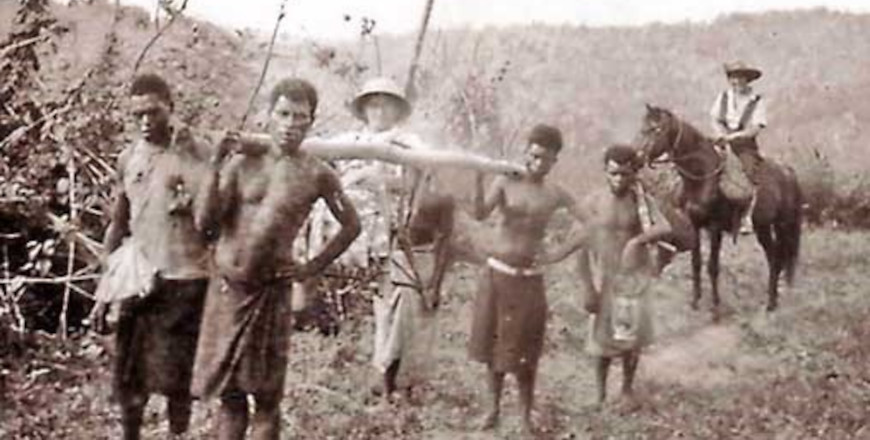Clara Pech, the fourth born sibling of 11 children, was one of 7 daughters and 4 sons of a couple who were dedicated mission-supporters farming near Appila in the mid-north of South Australia. Clara was trained at the Royal Adelaide hospital as a registered nurse and then went overseas into service for the people in […]
Clara Pech, the fourth born sibling of 11 children, was one of 7 daughters and 4 sons of a couple who were dedicated mission-supporters farming near Appila in the mid-north of South Australia. Clara was trained at the Royal Adelaide hospital as a registered nurse and then went overseas into service for the people in New Guinea. Her youngest sister, Irmgard Kobelt, later gathered Clara’s letters which she wrote to people back home to gain an insight into Clara’s life in Papua New Guinea. The following extracts are from Irmgard’s writings.
In her letters from New Guinea, Clara wrote of her first impressions of this tropical country and its fascinating people.
She wrote of the impressive scenery and beautiful views, of the ever-present deep dark greens and luxuriant growth everywhere; tall thick jungle on steep rugged mountains, with a few clearances here and there covered with rank kunai grass, all this growth coming right down to the sea. Of the bounteous sea life in the coral gardens, the rough shorelines of coral boulders with only a few sandy beaches here and there, of swift rivers and then the many waterfalls of smaller streams in narrow gorges forming a natural swimming pool. Those massive high mountains so near never failed to impress and inspire her.
Arriving in 1935 in the middle of the dry season Clara found the coastal climate enervating. The hospital of the Lutheran Mission at Finschhafen (Kakako) where she was stationed was short-staffed, so she was soon doing both day and night duty in the European section, besides running the household for these and other Sisters with a bevy of local teenage girls who could only understand the Yabem language. Therefore, she started to learn this language in any spare minute she could find, then later the Kotte language also, as both were needed to communicate sufficiently, especially with women and children from various areas in the wards. (Jabem is the language of the coastal people and Kotte is that of the nearby mountain regions.)
The only teachers for her were her missionary male patients when available. The natives were very patient with her attempts at talking with them. She soon learned to love these unaffected people who, despite their rather indolent and unhurried ways, were mostly loyal friends to their mentors.
Clara also learned to appreciate the fellowship of others- staff members who came from Germany, America and Canada. Here, because they depended so much on each other’s help, they formed a “big happy family”, in sorrow and in joy, sharing much.
The food and housing were better than Clara expected. Transport was by horseback, or on foot, or by boat. Everyone had their stories of hair-raising experiences of horse riding, and Clara soon had hers too. Once she was riding through the river on horseback. She was washed out of the saddle but managed to swim ashore in her riding culottes (cropped trousers for women), not knowing she should have grabbed the horse by the tail, which would have towed her to shore.
Mail and supplies came by ship only every six weeks. There was no airmail yet, no refrigerators or life-saving antibiotics. During her first year she had a share of tropical ailments to cope with and to recover from, besides nursing others to recovery.
After World War 2, all these things improved and amenities increased.
In the meantime, after she was there 3 years, Clara married the Australian skipper of the mission schooner and both continued to live at Finschhafen and serve for another 34 years (less four war years, being 1942 to 1945).
They raised a family of four children. Eventually when war was over, they were the first staff allowed back to Finschhafen.
Slowly over the years they shared the joy of seeing the Gospel accepted and spread farther and farther and saw the native’s progress and become aware of their destiny. Teaching and training so many of them from scratch continually in a variety of spheres, after years they saw leaders of both genders emerge.
They saw womanhood raised in status, and men and women take on positions of responsibility that were once only a dream. Truly a rich and full life.
If you would like to consider the opportunity to serve as a volunteer in mission, serving in practical ways, teaching English, teaching in the seminaries and institutions of our partner churches, or in local churches, you are invited to phone LCA International Mission on (08) 8267 7300 or email lcaim@lca.org.au. For more information, go to https://www.lcamission.org.au/join-gods-mission/volunteer/
Read more stories about volunteering at www.lcamission.org.au/category/join-gods-mission/volunteers/


0 Comment